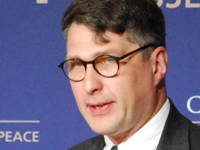Registration
You will receive an email confirming your registration.
IMGXYZ1249IMGZYXWith U.S.-Russia relations now at a critical juncture, it is ever more crucial to identify ways in which to improve bilateral relations. Institute for National Strategic Studies’ Eugene B. Rumer and Georgetown University’s Angela E. Stent joined the Carnegie Endowment to present the conclusions of a bi-partisan study, “Repairing U.S.-Russian Relations: A Long Road Ahead,” that focuses precisely on this issue. Carnegie’s James Collins participated in the study and moderated the discussion.
Importance of Russian Cooperation
While some skeptics argue that the U.S. no longer needs Russian support, Rumer and Stent presented several areas where Russian cooperation remain vital for achieving American goals. Some of these areas include:
- Ending both Iran’s and North Korea’s nuclear programs;
- Enacting new arms-control agreements;
- Ensuring a safe and continuous supply of oil and gas;
- Delivering supplies to Afghanistan;
- Cooperating within the post-Soviet region;
- Combating global warming.
Recommendations
Proposals on the way in which the U.S. should go about improving its relations with Russia included:
- Pragmatism: Both Presidents Clinton and Bush lacked structure in their dialogues with Russian counterparts and over-personalized their relations with Russian leaders as a result. A more pragmatic and less personal relationship is needed between President Obama and President Medvedev.
- Europe: The U.S. should cooperate more closely with its European partners on ‘resetting’ its relations with Russia.
- Atlantic Security: NATO members should seriously consider President Medvedev’s proposal for a new Atlantic Security Structure, a configuration that would seriously engage Russia. The new organization can b structured similarly to the OSCE (Organization for Security and Co-operation in Europe) but without a focus on domestic arrangements.
